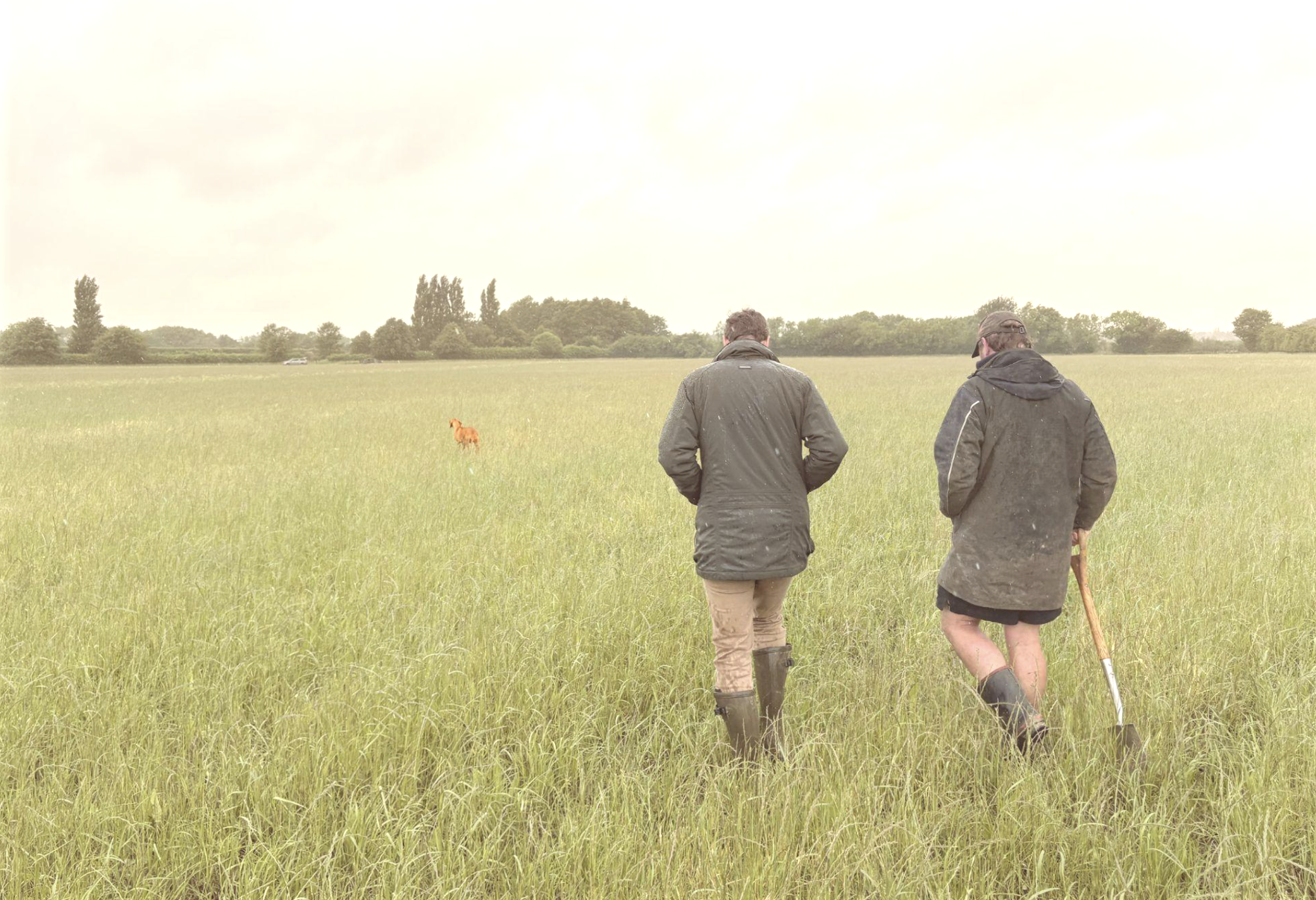Cotswold Seeds has partnered with Biolevel, which has developed a mix of biological soil microbes, which can be incorporated into our grass seed mixtures. Earlier this month, Biolevel MD Laurence Berman and Sam Lane visited Eastbrook Farm, managed by Helen Browning OBE (CEO of the Soil Association), to see how Biolevel’s seaweed-inoculated mix delivered a range of benefits, including looser soil structure, faster water infiltration, and improved plant establishment.
Earlier this month, I had the pleasure of visiting Eastbrook Farm, a truly inspiring regenerative farm just outside Swindon in the Cotswolds. I met with Sam Lane, Head of Technical (and Commercial Manager) at Cotswolds Seeds.
Our Collaboration So Far
We’ve been partnering with Cotswolds Seed for some time, aiming to develop a method of incorporating our market leading biological inputs into their rich portfolio of grass-seed blends in an easy-to-use form that matches their organic/regen ethos. Getting the product right required close collaboration and partnership, and the patience ultimately paid off: After trying different avenues we concluded a combination of best in class biology paired with seaweed meal as a convenient additive to grass seed blends! A dry, stable carrier that lightly coats each seed in the bag, with no dust cloud, just a faint “whiff of the sea and trillions of beneficial microbes.” When farmers sow the mix, they get the even distribution of both seaweed and Biolevel microbes right where the grass seeds are planted. This method has proven incredibly consistent, durable, and aligned with Cotswolds Seed’s commitment to organic/regenerative agriculture.
Farmer-Led Trial: Eastbrook & Lower Farm
I toured two neighboring farms—Eastbrook and Lower Farm—totaling around 1,800 acres of certified organic and in-conversion fields. Both farms are managed by a family partnership: Helen Browning OBE (CEO of the Soil Association), whose family have been tenant farmers here for over 70 years, and Henry have built a reputation for excellence in British organic farming. Although I didn’t meet Helen this time, I was lucky to spend the day with Henry, their daughter Sophie (mother and part-time vet!), and her husband Dai. Their passion for regenerative practices and livestock integration (two dairy herds, pigs, diverse crops) was infectious.
On one large grazing field, less than one year into its conversion from conventional row crops, we observed and sampled a trial divided in three zones across the whole field:
- Zone A: Grass seed mix without Biolevel
- Zone B: Grass seed mix with Biolevel (seaweed meal inoculation)
- Zone C: Grass seed mix with a fungal inoculant but without Biolevel
Here’s what we saw:
- Zone A (No Biolevel): Soil hard as concrete—probes and shovels barely made a dent, roots struggled to establish deep penetration, and grass diversity was visibly lower.
- Zone B (Biolevel): Penetrating the soil was noticeably easier, the grass stand was thicker, and we spotted a higher diversity of species (exactly what a regenerative pasture needs).
- Zone C (Fungi only): Also much better than Zone A, but in our (admittedly biased) opinion, didn’t quite match the vigor and diversity we saw in Zone B.
Key Takeaways
- Even in year one of conversion, Biolevel’s seaweed-inoculated mix delivered looser soil structure, faster water infiltration, and richer plant establishment.
- We didn’t see many earthworms just yet—understandable, as full soil biology recovery takes time. In our estimate, fields shifting from conventional row crops to diverse, microbe-inoculated seed mixes will likely need 2–3 applications over at least 2–3 years to build a robust soil ecosystem.
- Once that foundation is laid, farmers can enjoy a vibrant, self-sustaining pasture perfect for grazing dairy or beef cattle, pigs, sheep, goats—even poultry!
A huge thank-you to Sam Lane and the entire team at Cotswolds Seed for their ongoing collaboration, and to Henry, Sophie, and Dai from Eastbrook Farm Partnership for opening their fields and time to us. It’s incredible to see what’s possible when farmers, seed suppliers, and biotech innovators work together toward a truly regenerative future.
The Biolevel beneficial microbes can be added to any Cotswold Seeds mixture at the warehouse, a way to re-introduce lost biology back into your soil for maximum plant performance. Years of intensive farming can destroy these important microbe populations, so re-establishing them can play an important part in the recovery of your soil's fertility.
Read more here: https://www.cotswoldseeds.com/articles/677/introducing-natural-nutrition-from-beneficial-soil-microbes
If you have questions about Biolevel, seaweed meal inoculation, or regenerative pasture trials, message Cotswold Seeds.
